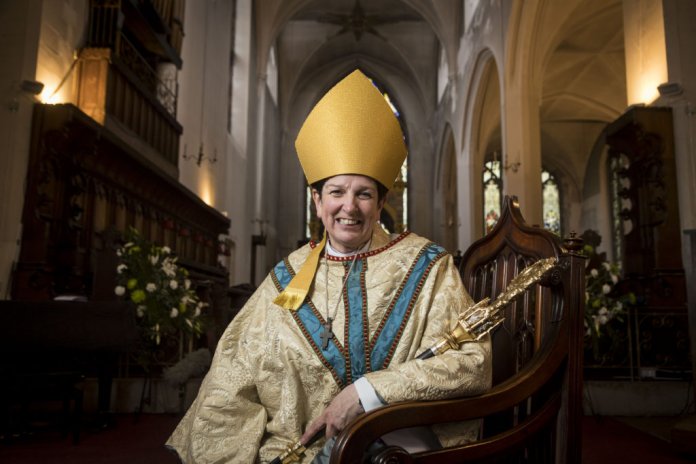The Rt Revd Anne Dyer, Bishop of Aberdeen and Orkney, was suspended in August 2022.
This followed a number of allegations of bullying and an Independent Review of the Diocese by Sir Ian Torrence, Pro-Chancellor of the University of Aberdeen, which concluded, “I recommend that, for the good of the diocese, she be immediately granted a period of sabbatical leave and step back permanently from the diocese.” The Report makes grim reading despite being “more general and less specific” than the anonymised appendix presented to the bishops alone. Sir Ian chose this approach because he took seriously the fact that almost all those he spoke to said, “they were afraid of retaliation in some form or another.”
In 2021, on receiving the Report and the more detailed appendix, the House of Bishops ignored the warning from Sir Ian that Bishop Anne Dyer did not have the “personal capacity to bring about healing and reconciliation in the diocese,” and embarked on a year-long mediation process. When that failed, they suspended her. Bishop Anne appealed her suspension in August 2022, but the appeal was overruled by the Episcopal Synod a few months later.
The Disciplinary Tribunal was due to sit this Autumn, but earlier this week, Mr Paul Reid KC, the Procurator of the Scottish Episcopal Church, chose “to lead no evidence,” thus bringing the proceedings against Bishop Anne to an end. He explained his reasons in a legal Note.
Despite, remaining, “of the view that there is sufficient evidence to provide a realistic prospect of conviction in respect of each allegation,” Reid was concerned that prosecution was not in the ‘public interest’, which he defined as “considering the wider Church Community and general confidence in the Church”, including “having regard to the effect of proceedings upon the complainers.”
Reid notes that, “the prospect of giving evidence, and in particular facing cross-examination in a public forum, is a source of anxiety for a number of potential witnesses,” and suggests that “special measures” would have been required to support them.
He then raises the concern that with a trial date unlikely to be before the Spring of 2025, in “a case which turns on first-hand accounts of events which are already a number of years ago, that is unfortunate.” He suggests that the risk that such evidence is not accepted due to the length of time since the events took place would further increase the anxiety of the complainants.
Finally, Reid considers the possible sanctions. These could include removal from office, disqualification from office and prohibition from the exercise of ministry. However, he suggests that the fact that Bishop Anne will already have been suspended for more than two years on an interim basis at the time of trial “materially increases the prospect” that “even in the event of conviction” Bishop Anne would return to the diocese immediately after the trial, “making an already difficult situation worse.”
Thus, he decided it is not in the “public interest” to continue with the prosecution. The Episcopal Synod are once again looking to mediation to improve the situation.
True to form, Bishop Anne Dyer is unapologetic, saying in a statement that, “Justice has been served and I am looking forward to resuming the full range of my duties in the service of my diocese in the days and weeks ahead. My legal team had full confidence that none of the allegations would have withstood examination by a fair and impartial tribunal.”
The complainants, who were not informed of the Prolocutor’s decision before publication, may think otherwise.
In his report, Sir Ian Torrence wrote, “‘Bullying’ is a form of behaviour about which it is notoriously difficult to be definitive in practice but it is broadly to do with oppression brought about by the uneven use of power.”
The bishops of the Scottish Episcopal Church chose to use their power to ignore the findings of the Torrence Report. In doing so they delayed proceedings against one of their own. The bishops were then consulted as to who the Provincial Standing Committee should choose as the new Procurator. The appointed man then used the power he had been given to avoid a potentially embarrassing public trial and protect the “general confidence in the Church.” It’s all rather too neat.
Similarly, citing the anxiety of the complainants as a reason not to prosecute comes rather too close to victim blaming. As one potential witness, Revd Professor David Atkinson told the Church Times, “The idea that justice shouldn’t be done because it might make a victim anxious is extraordinary. A horrifying range of different types of abuse could be swept under the carpet on the same basis.”
British Prime Minister William Gladstone was no stranger to the Scottish Episcopal Church, his mother was brought up as a devout evangelical member of the Church. It is perhaps fitting that many will turn to a legal maxim, said to have been coined by Gladstone, when they reflect on these events.
“Justice delayed is justice denied”.
It is maxim that has also been quoted regularly with reference to the Makin Review into the Church of England’s role in the failure to prosecute John Smyth.
The Makin Review was announced in August 2019 – nearly forty years after the abuse had first been reported. Five years later the victims are still waiting for its findings. Those who are familiar with both sagas may note other similarities in the behaviour of senior figures: allegations of abusive behaviour reported to those in authority; an initial investigation that substantiates the claims; a decision is made not to ‘prosecute’; and, according to the Scripture Union Independent Review, “Victim-blaming by those linked to the case, in the face of widespread rumours, is widely evidenced in recordings and documents shared with the Reviewer.”
It is worrying if the only lessons being learned from the past are about how to delay proceedings and protect those with power.



